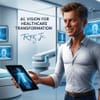Robert F. Kennedy Jr.'s presidential campaign has highlighted the potential of artificial intelligence to transform the healthcare industry. AI is being increasingly used to improve disease diagnosis, streamline clinical workflows, and personalize medicine. For instance, AI-powered diagnostic tools can analyze medical images and patient data to help doctors diagnose diseases more accurately and quickly.
AI can also assist in reducing healthcare costs by identifying inefficiencies and improving workflow. Some companies are already working on AI-driven healthcare solutions, such as AI-powered diagnostic tools that can diagnose strep throat using smartphone cameras. These advancements have the potential to revolutionize healthcare and improve patient outcomes.
However, there are also concerns about relying solely on AI for critical decisions like drug approvals, and ensuring the accuracy and reliability of AI-generated results. As AI continues to evolve in healthcare, it's crucial to address these concerns and ensure that AI is used responsibly and effectively. By harnessing the power of AI, we can create a more efficient, effective, and patient-centered healthcare system.


